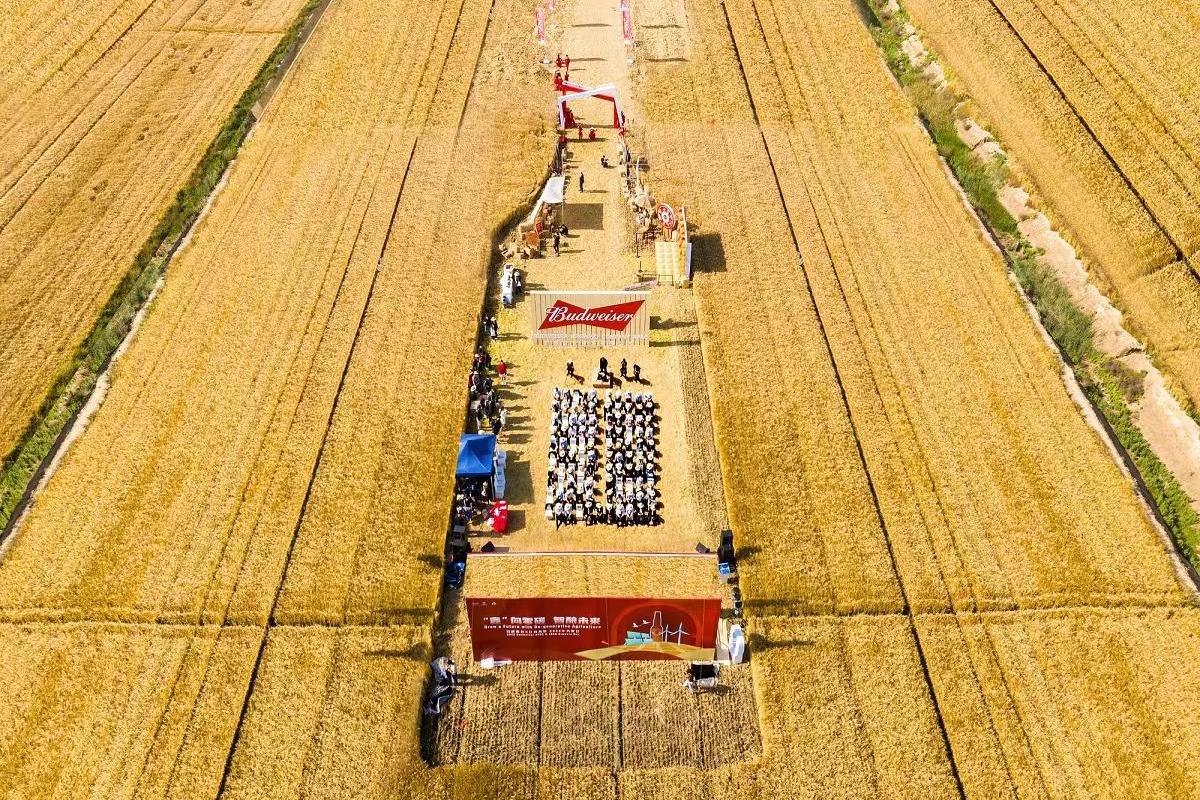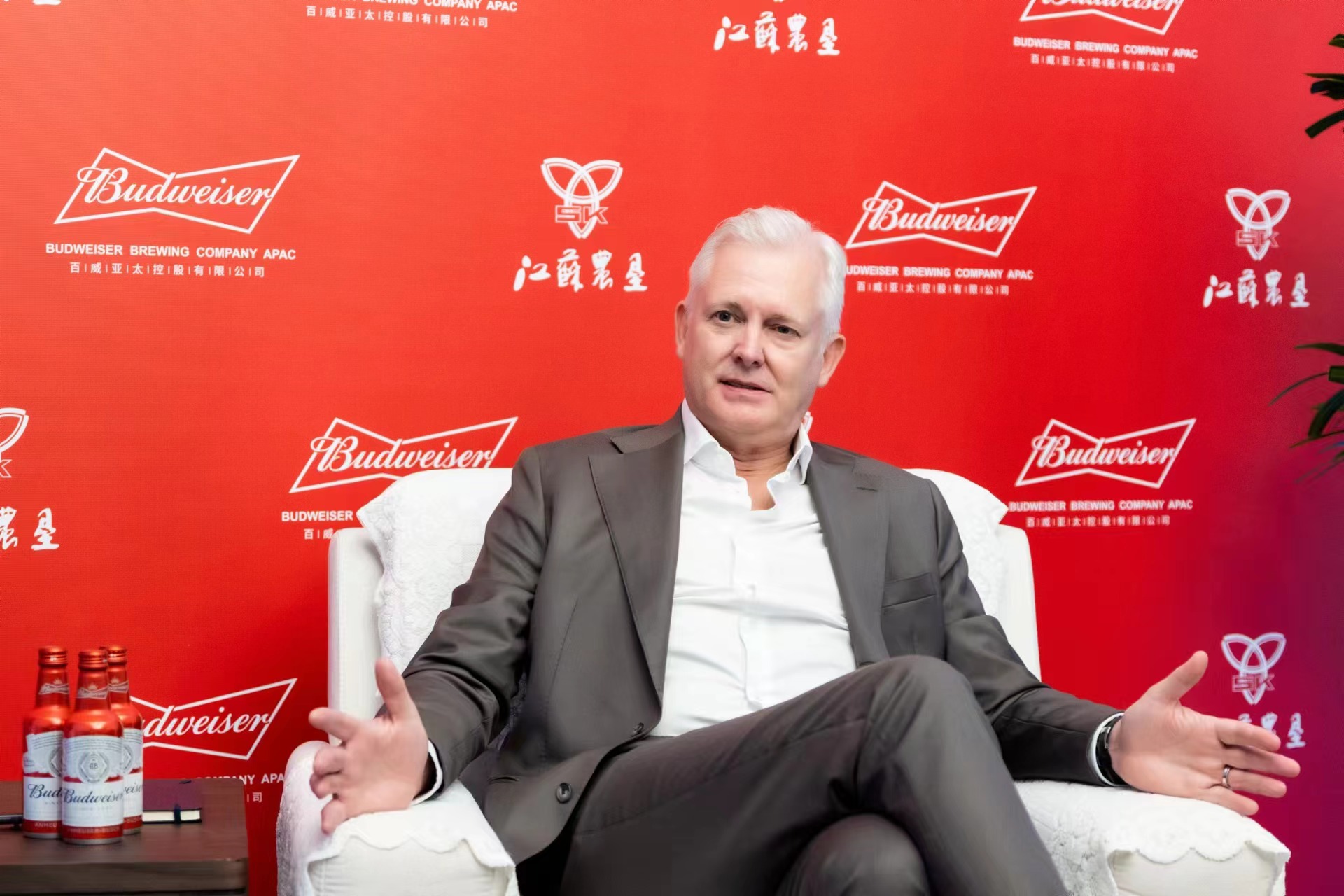 Budweiser Melds Global Approach, Local Solution as Sourcing Strategy
Budweiser Melds Global Approach, Local Solution as Sourcing Strategy(Yicai Global) May 26 -- Budweiser, the world’s largest brewer, combines a global approach with local solutions to address the challenges of securing raw materials such as malting barley, said the global vice president of procurement at Anheuser-Busch InBev, its Belgian parent company.
That is especially true in China, where over 90 percent of barley is imported. Budweiser began working with Jiangsu Nongken Group, a Chinese state-owned agribusiness, in 2016 to grow malting barley in the country, Patrick Meuller said in a recent interview with Yicai Global.
Malting barley is the main cereal used to brew beer. Budweiser’s planting and purchases of grains in China has been continuously increasing, with the brewer buying 60,000 tons this year, more than double the amount of 2021.
To address climatic risks to agricultural produce, Budweiser is developing more climate-resistant and high-yield varieties of barley and is increasing its flexibility in sourcing options and specifications, Meuller said.
“Localization also plays a strong role in shortening supply chains and supporting local communities, which in turn benefits farmers and crops,” he said.
To cope with the challenges of implementing re-generative agricultural practices while maintaining profitability, the brewer also looks for vertical and horizontal types of collaboration, for example, by providing know-how to farmers and partners and by sharing mature global practices where they are needed.
The procurement has changed in recent years due to the strong trend of premiumization, diversification of product portfolio, growing health awareness, and the need to develop local ecosystems, said Meuller, and AB InBev has invested in research and expanded capacities and will continue to do so to address import deficiencies and show the direction in local markets.
“We are ready to make the right investments for the long term to show the way.” Meuller said.

Below are excerpts from the interview:
Yicai Global: Agriculture is very time-consuming, while an enterprise needs to make profits and respond quickly. How do you cope with such challenges?
Patrick Meuller: Yes, it is challenging. One of the benefits we have is that we are a truly global company. We are not only the world's largest brewer, but also the world's largest maltster with malting operations across a big part of the world. What we are trying to do is to nurture different partnerships in different parts of the world and look for both vertical and horizontal types of collaborations.
Another benefit is that we have a whole web of agronomists that is really providing know-how, knowledge transfer, from ourselves to the farmers and the corporates that we work with around the world and help with everything linked to the soil and the crop management practices.
YG: Apart from a high-dependence on imported barley in China, what are the challenges for raw materials procurement globally?
Meuller: I’ve been working across many different procurement fields, and I would say that raw materials and agricultural products are quite challenging, especially in today's world.
The first and foremost challenge is climatic risks. We've seen a lot of volatility for crops both when it comes to quality and quantity.
Number two is international trade regulations. We need to be extremely agile and develop more and more flexibility when it comes to sourcing options, but also when it comes to specifications and recipes to make sure we can qualify new suppliers and new varieties in an accelerated way.
But here is also where localization plays such a strong role to shorten the supply chains, both from a supply security perspective and from a kind of local community perspective. I think it's a combination, almost like a ‘glocal’ approach: global sourcing optimization, but still finding the local solutions.
YG: How do you balance importing and growing local malting barley?
Meuller: If we talk about China specifically, malting barley is still very import dependent. That’s why this program we have with Jiangsu Nongken is so important. And what I’ve learned today is that it’s serving as a bit of a wakeup call to our industry peers in China, which is great. That is what we want to achieve. It is not only for us to grow local barley here, but also to move the industry forward.
Another thing which is worth mentioning is that in this very uncertain world, and with this volatility that we're living under, partnerships are more important than ever. Strategic supply relationships and close partnerships that are for the long-term, that justifies the investment of joint R&D and technology investments for the future.
YG: Consumer behaviors have changed over the Covid-19 period. How has procurement changed in the past few years?
Meuller: Premiumization is a very, very strong trend around the industrialized world. Consumers are consistently looking for high quality choices and also consistency. Also, with the rising economic and decision-making power of women, we are also seeing that the diversification of our product portfolio is becoming more and more important. We need to make sure that we develop new capabilities also within our sourcing functions that can cater for what we call more ‘beyond beer,’ or non-alcoholic demand profiles.
Also, more and more health awareness, which is driving local production. You trust local farmers, local ingredients, and local raw materials.
And, of course, it’s about investment in R&D, but also in new capacities. That's what we're busy doing around the world. As the world's largest maltster, where we have big import deficiencies, we look at either building more capacity ourselves or with third parties. We need to show the direction in each of these local markets that we believe in the markets and we are ready to make the right investments for the long term to show the way.
YG: How about malting barley prices this year?
Meuller: This year overall what we can see so far is that the barley harvest and crop development are overall positive. Barley is a very small category, and malting barley is even smaller, very much linked to the prices of wheat, feed barley, corn, etc. We're riding on that tail wind for now.
But if you look at the net balance, in terms of supply-demand balance, if you look at the ending stocks on barley, both for the end of 2022 and projected for the end of this year, it is still a relatively tight supply-demand balance. But overall, we're seeing the barley price coming down, especially in areas like Europe, and we are seeking to benefit from that.
Editor: Peter Thomas